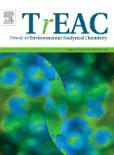
Trends in Environmental Analytical Chemistry
Scope & Guideline
Exploring Innovative Solutions for Environmental Challenges
Introduction
Aims and Scopes
- Analytical Methodologies for Environmental Contaminants:
The journal publishes research on diverse analytical techniques aimed at identifying and quantifying environmental pollutants, including organic and inorganic compounds. - Emerging Technologies and Materials:
Focus on the development and application of novel materials and technologies, such as nanomaterials and advanced sensors, to enhance the sensitivity and specificity of environmental analyses. - Microextraction and Sample Preparation Techniques:
Research on innovative sample preparation methods that improve the extraction and concentration of trace analytes from complex environmental samples. - Chemometric and Data Analysis Approaches:
Utilization of chemometric techniques to interpret complex data sets in environmental analysis, enhancing the understanding of contaminant behavior and distribution. - Sustainable and Green Analytical Chemistry:
The journal promotes research on environmentally friendly analytical practices, emphasizing sustainability in analytical chemistry.
Trending and Emerging
- Nanotechnology in Environmental Sensing:
An increasing number of papers highlight the use of nanomaterials in sensor development, indicating a trend towards more sensitive and selective detection methods for environmental contaminants. - Portable and On-site Analytical Devices:
Emerging research emphasizes the development of portable analytical tools, which facilitate real-time monitoring of environmental pollutants, catering to the demand for rapid analysis in field conditions. - Focus on Microplastics and Emerging Contaminants:
There is a growing body of work addressing the characterization and analysis of microplastics and newly recognized contaminants, reflecting heightened awareness of their environmental impact. - Advanced Mass Spectrometry Techniques:
The journal shows a marked increase in publications utilizing advanced mass spectrometry methods, such as high-resolution and non-targeted approaches, for comprehensive environmental analysis. - Green Chemistry and Sustainability:
Research on sustainable practices and green chemistry principles is gaining traction, with an emphasis on reducing environmental impact and improving the greenness of analytical methods.
Declining or Waning
- Traditional Chromatographic Techniques:
There is a noticeable decrease in publications focusing solely on traditional chromatographic methods, as researchers increasingly explore more innovative and efficient techniques. - Basic Environmental Monitoring Techniques:
Research articles centered on conventional environmental monitoring are becoming less frequent, likely due to the shift towards more advanced and integrated monitoring systems. - Generic Pollutant Analysis:
Publications focusing on broad, non-specific analysis of pollutants are declining, as the journal trends towards targeted and specific detection methods using advanced materials.
Similar Journals

Pakistan Journal of Analytical & Environmental Chemistry
Connecting Global Minds in Chemistry and EnvironmentPakistan Journal of Analytical & Environmental Chemistry, published by the University of Sindh, National Centre of Excellence Analytical Chemistry, is a distinguished platform that has been committed to promoting high-quality research in the fields of analytical and environmental chemistry since its inception. With an ISSN of 1996-918X and an E-ISSN of 2221-5255, this journal has established itself as an open-access resource since 2007, facilitating the dissemination of knowledge to a global audience. Acknowledged for its contributions, the journal currently holds a Q4 category ranking in both Analytical Chemistry and Environmental Chemistry as of 2023, with Scopus rankings placing it within the challenging competitive bracket. The journal aims to publish original research, reviews, and technical notes that elucidate contemporary challenges and advancements, making it an essential read for researchers, professionals, and students who are exploring innovative methodologies and solutions in chemical analysis and environmental monitoring. By fostering a collaborative research environment and encouraging multidisciplinary approaches, the Pakistan Journal of Analytical & Environmental Chemistry plays a crucial role in advancing the field and addressing environmental concerns in Pakistan and beyond.

ATOMIC SPECTROSCOPY
Catalyzing Breakthroughs in Analytical Chemistry.ATOMIC SPECTROSCOPY is a distinguished journal specializing in the field of spectroscopy and published by ATOMIC SPECTROSCOPY PRESS LTD. With ISSN 0195-5373 and e-ISSN 2708-521X, this journal has been a cornerstone in advancing the discipline since its inception, thriving in its relevant domain for over four decades, covering converged research years from 1980 to 1989 and from 1996 to 2024. Currently holding a Category Quartile of Q2 in Spectroscopy for 2023, ATOMIC SPECTROSCOPY ranks 34th among 76 in its field according to Scopus, placing it in the 55th percentile, thereby affirming its critical role as a resource for researchers, professionals, and students alike. This journal serves as a platform for disseminating innovative research, methodological advancements, and breakthroughs in atomic and molecular spectroscopy, fostering a comprehensive understanding that is essential for progress in analytical chemistry and related disciplines. While it operates under a non-open access model, the journal ensures broad reach and visibility within the academic community. For those passionate about spectroscopy, ATOMIC SPECTROSCOPY remains an invaluable resource for staying updated on the latest developments, contributing to its reputation as a leading journal in the field.

CHINESE JOURNAL OF CHEMISTRY
Advancing the frontiers of chemical research.The CHINESE JOURNAL OF CHEMISTRY, published by WILEY-V C H VERLAG GMBH, is a distinguished peer-reviewed journal that has been contributing to the field of chemistry since its inception in 1990. With an impressive Q1 ranking in the Chemistry (miscellaneous) category and a Scopus rank of 67 out of 408, this journal is recognized for its rigorous scholarly standards and significant impact within the academic community. Renowned for publishing high-quality research, reviews, and insightful commentaries, the journal serves as a vital resource for researchers, professionals, and students keen on advancing their understanding of general chemistry and its applications. Although it does not offer open access, the journal remains an essential outlet for innovative chemistry research, attracting contributions from a global network of specialists. With its broad scope covering various aspects of chemistry and a commitment to fostering scientific dialogue, the CHINESE JOURNAL OF CHEMISTRY is poised to continue its role as a central pillar in the ever-evolving landscape of chemical sciences.

Chemical Methodologies
Exploring New Frontiers in Chemical ResearchWelcome to Chemical Methodologies, a premier journal published by SAMI PUBLISHING CO-SPC, dedicated to advancing the field of chemistry through innovative research and methodologies. With an ISSN of 2645-7776 and an E-ISSN of 2588-4344, this journal provides a vital platform for researchers and scholars to share their findings in areas encompassing physical, theoretical, and organic chemistry. Despite its initial HIndex and quartile rankings still being established, the journal's evolving impact within the academic landscape is underscored by its Scopus Ranks, which place it in the 35th percentile for physical and theoretical chemistry and the 33rd percentile for organic chemistry. Since its inception in 2022, and continuing through 2024, Chemical Methodologies aims to foster collaboration and knowledge dissemination among academics and practitioners alike, bridging theoretical concepts and practical applications. This open-access platform enhances accessibility for researchers and students worldwide, ensuring that groundbreaking contributions to chemical science reach a broad audience.
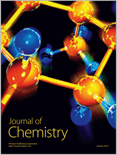
Journal of Chemistry
Advancing the Frontiers of Chemical KnowledgeJournal of Chemistry, published by Hindawi Ltd, serves as a critical platform for advancing knowledge in the field of chemistry, particularly in its miscellaneous sub-disciplines. With an impressive 2023 Scopus Rank of #123 out of 408 and positioned in the Q2 quartile, this journal exemplifies a robust academic rigor that appeals to researchers, professionals, and students alike. It features articles related to innovative chemical research and developments, catering to a diverse audience eager to contribute to the growing body of literature in the chemical sciences. The journal has been operational from 2013 to 2024, and its Open Access model ensures that findings are easily accessible to a global audience, fostering collaboration and knowledge sharing. With a commitment to quality and relevance, the Journal of Chemistry continues to play a significant role in shaping contemporary chemical research and education.
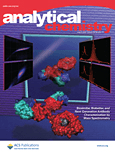
ANALYTICAL CHEMISTRY
Exploring the Depths of Chemical UnderstandingANALYTICAL CHEMISTRY, published by the American Chemical Society, is a leading journal in the field of analytical chemistry, with a significant impact factor reflecting its reputation and scholarly influence. With an impressive ranking of 14th out of 156 in its category, placing it in the 91st percentile among its peers, this journal is essential for researchers, professionals, and students alike who are looking to stay at the forefront of developments in analytical techniques and methodologies. Established in 1947, ANALYTICAL CHEMISTRY covers a broad range of topics within the discipline, all aimed at advancing the scientific community's understanding of complex chemical systems. Although currently not an Open Access journal, its rigorous peer-review process ensures the publication of high-quality research aimed at significant innovations in the analytical field. With its publication spanning up to 2024, it continues to be a valuable resource for those seeking to enhance their research and contribute to the global discourse in analytical chemistry.
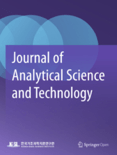
Journal of Analytical Science and Technology
Elevating Knowledge in Biochemistry, Genetics, and MoreJournal of Analytical Science and Technology, published by SPRINGER INT PUBL AG, stands as a pioneering platform in the fields of Analytical Chemistry and Environmental Science. With an ISSN of 2093-3134 and E-ISSN 2093-3371, this Open Access journal, available since 2013, provides esteemed researchers with an opportunity to disseminate innovative research across a broad spectrum of applied science disciplines. The journal features a comprehensive range of studies addressing pivotal issues within Biochemistry, Genetics, Molecular Biology, Materials Science, and Physics, demonstrated by its impressive 2023 Scopus rankings in multiple categories, including Q2 in Chemistry and Environmental Science. Positioned within the UK and served from Switzerland, the journal actively encourages contributions that contribute to both practical applications and theoretical advancements, playing a vital role in fostering knowledge and collaboration among professionals, researchers, and students alike. Engage with the Journal of Analytical Science and Technology to contribute to and explore groundbreaking advancements within the analytical sciences.

RUSSIAN CHEMICAL BULLETIN
Delivering Essential Findings for Tomorrow's Chemists.RUSSIAN CHEMICAL BULLETIN, published by SPRINGER, serves as a pivotal resource in the field of general chemistry, covering a wide array of topics that impact both theoretical and applied chemistry. With an ISSN of 1066-5285 and a presence since 1993, this journal provides a platform for disseminating significant research findings, practical applications, and novel methodologies within the broader chemistry community. While it currently holds a Q3 ranking in the Chemistry (miscellaneous) category and occupies the 230th position out of 408 in the Scopus rankings, its reputation continues to grow, fostering collaboration and innovation among researchers and professionals alike. Although the journal does not offer an open-access model, it is committed to making findings accessible within the academic community, ensuring that valuable insights can inform future research. With an anticipated convergence of studies extending to 2024, the RUSSIAN CHEMICAL BULLETIN remains an essential reference for those dedicated to advancing chemical science.
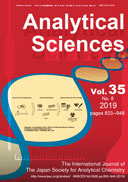
ANALYTICAL SCIENCES
Unveiling Insights, Shaping the Future of ChemistryANALYTICAL SCIENCES, published by SPRINGERNATURE, is a prestigious journal established in 1985 dedicated to advancing the field of analytical chemistry. With an ISSN of 0910-6340 and an E-ISSN of 1348-2246, this journal plays a critical role in disseminating high-quality research and innovative methodologies. Operating from Switzerland, it aims to provide a platform for scholars, researchers, and professionals to explore significant developments and applications in analytical techniques. Although classified in the third quartile (Q3) of analytical chemistry, which places it in a competitive framework (Rank #96/156, 38th Percentile in Scopus), its impact on the discipline is noteworthy. While it is not currently an open-access journal, the resources within are invaluable for those seeking to stay at the forefront of research and practice in analytical sciences, making it an essential read for anyone involved in this dynamic field. The journal continues to converge critical insights from 1985 to 2024, fostering a community dedicated to innovation and excellence in analytical chemistry.

Analytical and Bioanalytical Chemistry Research
Bridging Disciplines in Analytical and Bioanalytical Chemistry.Analytical and Bioanalytical Chemistry Research is an esteemed open-access journal published by the Iranian Chemical Society, dedicated to the advancement of knowledge in the fields of analytical chemistry, biochemistry, and spectroscopy. Since its inception in 2014, this journal has provided a platform for researchers, professionals, and students to publish and access high-quality research articles that contribute to the understanding of chemical analysis and bioanalytical methods. With an ISSN of 2383-093X and an open-access model that promotes global dissemination of findings, it ensures that innovative research reaches a broad audience. The journal has consolidated its presence in the scientific community, currently ranked in quartile Q4 for analytical chemistry, biochemistry, and spectroscopy as of 2023. Its Scopus rankings, including a percentile of 34th in Analytical Chemistry, reflect its commitment to quality research and scholarly contribution. Situated in Tehran, Iran, the journal serves as a vital resource for academic discourse, offering insights into emerging trends and methodologies in analytical and bioanalytical chemistry.